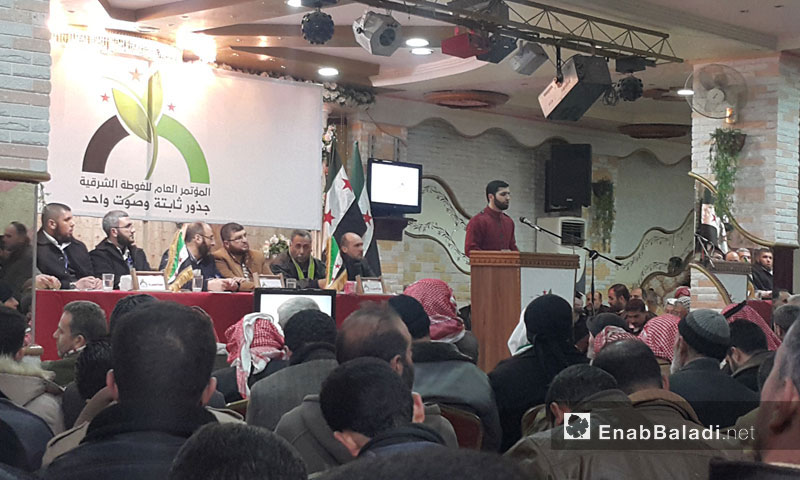Enab Baladi – Eastern al-Ghouta
Institutions and bodies from Eastern al-Ghouta are looking for a unifying vision to galvanize civic management of the area through its facilities and institutions and participation in shaping its policies and “critical” decisions. This prompted more than one hundred institutions and organizations to launch the “General Conference of Eastern al-Ghouta”, whose founding congress was held in the town of Masraba on Wednesday 18 January.
About 500 people representing 121 institutions, commissions and local councils took part in the conference, from a range of domains in al-Ghouta. The aim of the conference was to establish a clear vision and begin working on forming a single body that ensures “fair” representation for all these institutions, as Osama Hawwa, member of the preparatory committee of the congress, explained.
The search for equal representation
Hawwa told Enab Baladi that the conference was held in response to popular demands to unify civic institutions so that al-Ghouta can have one voice and ensure that all institutions are represented within a decision-making body. This body’s work will be complementary to that of the military, working to unify military efforts in order to create a general command for Eastern al-Ghouta.
Invitations were directed to all service, relief, medical and educational institutions, which were represented by their heads. The member of the committee explained that the preparatory phase had lasted between three and four months “until the general vision was set through finding common ground between the participating institutions regarding the purpose of the project in the general.”
The announcement of the General Conference came after it had become “a clear, established project in the minds of everyone.” Although there is a General Commission in al-Ghouta, which includes dozens of organizations, Hawwa thinks that al-Ghouta is in need of a unifying institution and fair representation, “This is what is missing in other bodies, that’s why some institutions including some who are represented within the General Commission, called for creating a new body.”
According to Hawwa, the withdrawal of many institutions when the General Commission was formed, due to lack of equal representation, meant that it could not succeed. He thinks that the new proposal “avoids making the same mistake made by the Commission and puts forward a vision that is appropriate for the current needs in al-Ghouta and the conditions that the revolution is going through. All previous projects failed to fulfill people’s expectations.”
The General Commission “has become homogeneous”
Mohammed Ali, director of the humanitarian organization “Bashaer”, attended the founding congress and described it as a “blessed and positive step that we’d been hoping to see in al-Ghouta for a long time.” In a conversation with Enab Baladi after the meeting, he expressed his optimism that the new body would gain support and succeed in its aims.
“Bashaer”, a humanitarian organization, began its work at the beginning of the revolution under the name “Damascus Countryside Relief Council”. It evolved to expand its activities over the last five years by supporting projects and creating job opportunities, according to its organizers.
According to Ali, “Al-Ghouta has suffered from a great deal of bloodshed and various conflicts”, a reference to the fighting between opposition factions last year and the fact that “the General Commission had many weaknesses. The coordinators of the new project tried to communicate with the Commission in order to fix the main issues that have been widely criticized but they didn’t succeed despite repeated meetings. So it has become a homogeneous body lately.”
Yasser Dalouane, director of the internal political bureau of Jaish al-Islam, said that the interaction during the conference he attended was “good,” stressing that the faction “supports any project that would unite efforts and civic work in al-Ghouta.”
In a conversation with Enab Baladi, Dalouane sees the need to “coordinate across al-Ghouta as a whole so that the new entity doesn’t duplicate any existing entity already in place.
”The General Commission of Eastern al-Ghouta, established in late 2014, includes about 250 figures. Twelve institutions, 65 civil society organizations and 32 local councils contributed to its establishment, according to its organizers.
The General Commission is preparing for its second session as its first session is soon coming to an end. According to its president, Mohammad Suleiman Dahla, they are aiming to evaluate the preceding session and to “build on what has been achieved.”
Dahla thinks that the General Conference “does not really merit its name since key institutions and figures did not attend. Instead, it was limited to a certain political group of the existing political groups in al-Ghouta, with all due respect, and which is closely linked to the legitimate military leadership of a faction that we respect and its related institutions and figures.”
The president of the General Commission told Enab Baladi that the door of the Commission “as a unifying civic umbrella for al-Ghouta is still open to everyone to actively take part in the workshops of its second session.”
It appears that working to create a single overall entity is no easy task. The people of al-Ghouta lay the blame for this on the scattered nature of work in the area and the conflicting views of decision-makers and representatives of commissions and organizations.











